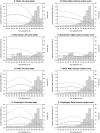Cardioprotective medication adherence in Western Australians in the first year after myocardial infarction: restricted cubic spline analysis of adherence-outcome relationships
- PMID: 32152400
- PMCID: PMC7062740
- DOI: 10.1038/s41598-020-60799-5
Cardioprotective medication adherence in Western Australians in the first year after myocardial infarction: restricted cubic spline analysis of adherence-outcome relationships
Abstract
Adherence to cardioprotective medications following myocardial infarction (MI) is commonly assessed using a binary threshold of 80%. We investigated the relationship between medication adherence as a continuous measure and outcomes in MI survivors using restricted cubic splines (RCS). We identified all patients aged ≥65 years hospitalised for MI from 2003-2008 who survived one-year post-discharge (n = 5938). Adherence to statins, beta-blockers, renin angiotensin system inhibitors (RASI) and clopidogrel was calculated using proportion of days covered to one-year post-discharge (landmark date). Outcomes were 1-year all-cause death and major adverse cardiac events (MACE) after the landmark date. Adherence-outcome associations were estimated from RCS Cox regression models. RCS analyses indicated decreasing risk for both outcomes above 60% adherence for statins, RASI and clopidogrel, with each 10% increase in adherence associated with a 13.9%, 12.1% and 18.0% decrease respectively in adjusted risk of all-cause death (all p < 0.02). Similar results were observed for MACE (all p < 0.03). Beta-blockers had no effect on outcomes at any level of adherence. In MI survivors, increasing adherence to statins, RASI, and clopidogrel, but not beta blockers, is associated with a decreasing risk of death/MACE with no adherence threshold beyond 60%. Medication adherence should be considered as a continuous measure in outcomes analyses.
Conflict of interest statement
The authors declare no competing interests.
Figures

References
-
- Roffi M, et al. 2015 ESC Guidelines for the management of acute coronary syndromes in patients presenting without persistent ST-segment elevation: Task Force for the Management of Acute Coronary Syndromes in Patients Presenting without Persistent ST-Segment Elevation of the European Society of Cardiology (ESC) Eur. Heart J. 2016;37:267–315. doi: 10.1093/eurheartj/ehv320. - DOI - PubMed
Publication types
MeSH terms
Substances
LinkOut - more resources
Full Text Sources
Medical

